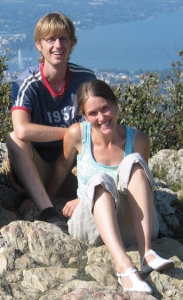
ATLAS e-News
23 February 2011
8 December 2008
Jonas Strandberg
Nationality: Swedish

“I think the money put in the summer school is among the best ways that CERN has to invest money!” says Jonas Strandberg, a Swedish physicist working on the Muon Spectrometer and Higgs Physics at ATLAS. He is another good example of the power of the CERN Summer School in drawing outstanding students into particle physics; since Jonas first came to CERN in the summer of 1998 as a physics undergraduate student, he always wanted to return.
Born in Gotland, a beautiful small Swedish island, Jonas moved to Stockholm to start high school. Even if he had no strong vocation for physics at school, he enjoyed science a lot and enrolled in physics at Stockholm University. In his second year, he met his wife Sara, who is also a physicist working in the ATLAS pixel detector.
After spending the summer of '98 at CERN, Jonas came back to do his master thesis in supersymmetry in Delphi. Then, he enrolled as a PhD student in Stockholm University working on Top Quark physics at D0. A year later, his wife Sara (pictured with Jonas) joined the same program. For five years, Jonas was based half the year at Fermilab. “I liked the working atmosphere at Fermilab a lot; it was very informal and young people were always encouraged to participate and share their opinions,” Jonas recalls.
When he finished his PhD, he did what he had always wanted to do since the summer school times and came to CERN as a postdoc affiliated with University of Michigan. “It was always on my mind to come back to CERN. I love it here. While the collaborations size is sometimes a problem, the diversity of people is amazing. It has always made me proud to see everyone cooperating towards a common goal.” Back at CERN, he had the opportunity to meet up many old friends from the CERN 98 Summer School again.
When it comes to Jonas’ way of spending his free time, he says it is a mixture of activities what keeps him busy. “I like very much board games and videogames, but also open-air activities, such as hiking.” In September, he and his wife spent nine days walking in Parc de la Vanoise.
He also loves to travel around the world. “Definitely one of the reasons I was attracted to particle physics is that it is an international discipline and forces you to travel a lot,“ he concedes. “I always want to be somewhere different to where I am,” laughs Jonas.
Recently, Jonas and his wife have been to Hawaii, where they got interested in diving. But the place he remembers as one of the most beautiful places he has ever been to is the Sahara desert.
The Strandbergs will remain in Switzerland for a couple of more years. When his position at CERN expires, Jonas would prefer to find a permanent position back in Stockholm if possible. “It’s difficult to find a permanent position now, and it’s even more difficult to find two permanent positions for me and my wife so we’ll see. And I definitely want to be here at CERN for the early days of the LHC.”
He says that in the US there is a longer tradition in offering permanent posts to couples, but in Europe it is still something that do not happen often. “But I am confident something suitable for the two of us will come up eventually,” he states with a smile.

Cristina JimenezATLAS e-News |